[Editor’s Note: the post below appears today on the front page of The Huffington Post.]
By Jason Apuzzo & Govindini Murty. Steven Spielberg’s Falling Skies has unexpectedly become one of the best sci-fi TV shows in years – a dark, gritty and emotional look at an American society struggling to survive after an apocalyptic alien invasion.
The show’s third season debuts on TNT this Sunday, June 9th on Father’s Day, which is appropriate, given the show’s focus on fathers and their responsibility toward their children. The series has already been a ratings bonanza for TNT – Falling Skies was last summer’s top-rated drama on basic cable – and having seen the first five episodes of the upcoming season, we can tell you that Season 3 looks to be an even bigger hit.
So why would the success of Falling Skies be unexpected, especially given the involvement of executive producer Steven Spielberg and series creator Robert Rodat (Saving Private Ryan)? Possibly because when the show first debuted in the summer of 2011 – the long, hot sci-fi summer that gave us Transformers: Dark of the Moon, Super 8 and Cowboys & Aliens – the idea of another movie or TV show about alien invasion seemed redundant.
And after getting their tails (or robot parts) kicked on-screen in recent years by Harrison Ford, Tom Cruise and the U.S. military, you’d think aliens would know better than to invade by now, anyway.
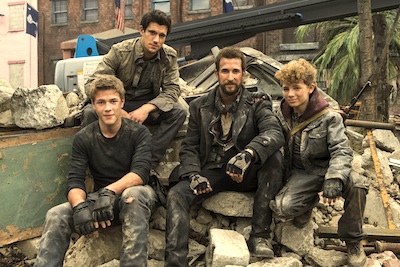
Starring Noah Wyle and Moon Bloodgood, Falling Skies (Season 2 of which arrived this week on Blu-ray) has carved out its own niche, however, largely by doing basic things well – telling a classic American story of the fight for freedom, and of families struggling to stay together in wartime. And with its populist vibe and focus on civic duty, Falling Skies is also the sci-fi show for audiences who don’t usually watch sci-fi. Indeed, the series often feels inspired as much by American Westerns as by science fiction.
And, of course, there’s always the magic touch of Steven Spielberg.
“Steven Spielberg is the master of science fiction, and of drama,” Noah Wyle told us recently at Zoic Studios in Culver City, where Falling Skies‘ visual effects were being completed. Series showrunner and writer Remi Aubuchon agreed: “Steven actually is very involved in our show … he certainly reads all the scripts and watches all the dailies, and he’s intricately involved in the design of the creatures and the cool things.”
Season 3 of Falling Skies picks up where the previous two seasons left off, with former history professor Tom Mason (Wyle) and his extended family trying to pick up the pieces of civil society in the wake of a devastating alien attack. Like some grizzled, bearded patriarch out of the old West – and now serving as the acting President of the United States – Mason tries to hold it all together, as his provisional government in South Carolina forges a dubious alliance with a new alien species encountered at the end of last season.
On the home front, Mason also welcomes an unusual new daughter into the world, born to Dr. Anne Glass (Moon Bloodgood), his longtime lover and the show’s emotional center. Meanwhile, Mason’s son Hal (Drew Roy) struggles to keep himself from being used by enemy aliens as a spy, all while juggling the two edgy blondes in his life (Sarah Sanguin Carter and Jessy Schram) – one of whom just happens to be the enemy aliens’ new commander.
Such is family life in Falling Skies.
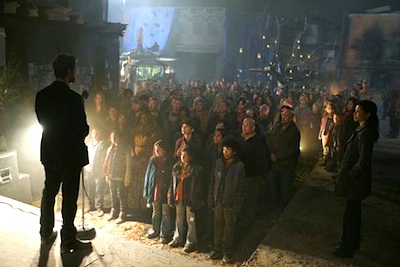
And as in previous seasons, Mason takes time in Season 3 to deliver more of his trademark, JFK-style speeches on American history and civic virtue. These impromptu civics lessons are a large part of what make Falling Skies stand out from run-of-the-mill sci-fi – as the series revels in exploring parallels between its alien war and American conflicts past and present.
Noah Wyle, who stars as Mason and also serves as a producer on the series, is clearly the soul of Falling Skies – and the lanky, cerebral actor relishes the opportunity offered by his character to teach lessons about citizenship. “Those civics lessons are in the scripts, and it is pre-meditated,” he told us, citing Abraham Lincoln, Thomas Jefferson and Andrew Jackson as influences on his characterization of a wartime President.
“The character’s [Mason’s] arc has been an interesting one, because … the first season was the deconstruction of an individual, taking a guy who had a really great skill set in the realm of academia and showing how useless that skill set would be in the face of an alien invasion – and then, toward the end of that season, realizing that there was this possible synthesis to be made,” Wyle told us. “Some of the things he knew about could – in the form of historical parallels – benefit this group [Falling Skies‘ 2nd Massachusetts militia regiment] in a strategic sense.
“And then, the next hurdle [in Season 3] is to sort of bridge the gap between his ever-growing militancy and that academic background – and create this sort of warrior-statesman.”
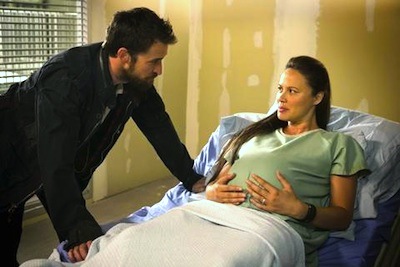
As Moon Bloodgood cautions, however, Falling Skies offers more than just history lessons – or intense, urban combat with high-tech alien invaders, of which Season 3 is chock full. “I think what makes our show good is that we never get so caught up in the toys that we forget about the through lines of the characters,” the former Terminator Salvation star told us. “You know there’s just a lot of layers to our show, and each character comes with a lot of weight.”
In an usual move (especially for a sci-fi series), the show’s producers encouraged Bloodgood to get pregnant at the end of Season 2, as it was revealed in the season-ending cliffhanger that Dr. Anne Glass would be expecting a child with Tom Mason. Dr. Glass’ pregnancy – which plays a huge role in Season 3 – is one of many family-oriented subplots raising the stakes for the characters. Speaking of her work on the show’s first three seasons, Bloodgood told us: “It didn’t feel like science fiction – it felt like a story about a family. The family was the primary story, and the science fiction element was secondary.”
Of course, the harsh, post-apocalyptic world that Falling Skies‘ families occupy is a far cry from that of contemporary America – and more often resembles the Wild West of the 19th century. Mounted on horseback and wearing bandoliers (Wyle even arrived at his press day interview wearing his trademark Western vest from the series), Falling Skies‘ characters often seem to be living out fantasies of rugged frontier life in an alternate, mythic West.
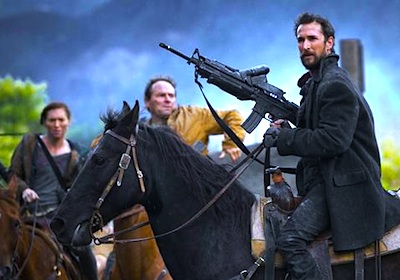
“There are tremendous commonalities between Westerns and science fiction stories,” David Weddle, a writer and co-executive producer on Falling Skies, told us in a recent phone interview. In both genres, according to Weddle, “it’s usually characters traveling across – or marooned in – an existential wasteland. There’s no infrastructure around them, there’s no government, there’s no bureaucracy. There’s no authority that’s establishing any value system by which everybody conforms. So the characters are forced to make their own moral decisions … which is exactly where the 2nd Mass is.”
Apropos of its Western themes, Falling Skies often features homages to director Sam Peckinpah’s films – such as the brothers Tector and Lyle from Season 2, modeled after Ben Johnson’s and Warren Oates’ characters from The Wild Bunch.
The Falling Skies character most indebted to Peckinpah, however, might be fan favorite John Pope – the wild, anarchic outlaw with a conscience, played by Colin Cunningham.
According to Weddle, author of the definitive biography on Peckinpah, If They Move . . . Kill ‘Em!: The Life and TImes of Sam Peckinpah, “Pope is not unlike Pike Bishop [from Peckinpah’s The Wild Bunch]. He’s the lowest of the low. He’ll kidnap people, hold them for ransom … he has violent, volatile, politically-incorrect impulses. But when push comes to shove, he’s really become a member of the family. Though he would hate it if you told him that. I don’t recommend going to Pope’s saloon and telling him that,” joked Weddle.
Further deepening its connections to the American West, Season 3 of Falling Skies features an important plotline involving a new alien nicknamed ‘Cochise,’ played with quiet dignity by movement actor Doug Jones. Mirroring the fate of the historical Cochise, the alien is never totally trusted by his human allies.
“‘Cochise’ was not a random name chosen,” Remi Aubuchon told us. While cautioning that the show is “not trying to mimic history,” the historical Cochise, said Aubuchon, was “someone who we never completely trusted [in terms of] his motivations – it wasn’t until history proved that his motivations were actually pure and full of good intent.”
Doug Jones’ pleasure in performing the complex new alien character clearly comes through: “He’s got layers and history of his own – and a sense of home – that he can relate to the humans with.”
Wyle agrees that Falling Skies captures the spirit of America’s frontier past: “I felt that since [during the aliens’ initial attack] the power grid had been knocked out, and these people each subsequent season were getting thrown back farther and farther into a 19th century form of existence, that that should be somehow be replicated in the texture of the show,” Wyle said.
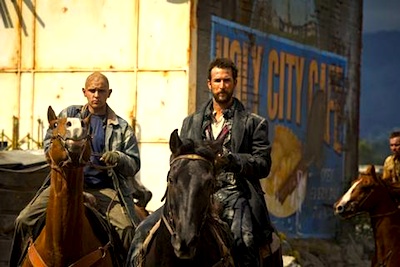
And as with Weddle, Western movies are never far from Wyle’s mind. “Will Patton [who plays Col. Dan Weaver] and I love Westerns, and we love John Ford Westerns, in particular. And so we early on decided that we would play out variations of the John Wayne-Ward Bond friendship/rivalry, just for our own amusement,” Wyle dryly noted.
Wyle also cites Ford’s Fort Apache as an influence: “Henry Fonda’s performance in Fort Apache – I thought there was a lot there of what I needed to incorporate into Tom Mason’s character. That out of necessity he [Fonda’s character Owen Thursday] had to harden himself, and sort of quell all the more humanistic aspects of his personality to get the job done – I thought that was a really interesting thing to explore.”
Of course, Falling Skies also owes a great deal to the alien invasion genre – with story elements seemingly inspired by Robert Heinlein’s The Puppet Masters (1951) and John Christopher’s Tripods novels (1967-68). And, of course, there’s always Don Siegel’s 1956 alien invasion classic, Invasion of the Body Snatchers (on which, as Weddle notes, Sam Peckinpah did an uncredited script rewrite – while also acting in the film).
As Weddle told us of Body Snatchers: “It’s an archetypal story, just like a Western. It’s talking about America in the ’50s. It’s talking about the forces of conformity. … Invasion of the Body Snatchers is pervasive to science fiction,” he said.
“When you look at the Karen character [the teenage-girl-turned-alien-overlord in Falling Skies], and how she says she’s ‘had an awakening to the Master,’ and that she’s ‘much happier than she’s ever been before’ since she got a harness put on her back – that’s right out of Body Snatchers.”
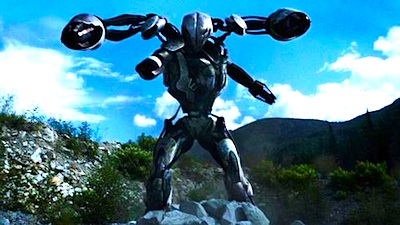
Ultimately, though, Falling Skies seems most likely to be remembered as another distinguished entry in Steven Spielberg’s huge body of work as a director and producer of science fiction. The show perhaps most resembles what Spielberg’s War of the Worlds (2005) might’ve been like had it been translated into an epic TV series – and feels much grittier in tone than what audiences raised on Close Encounters of the Third Kind (1977) and E.T. (1982) have come to expect from the legendary director-producer.
And while the show retains Spielberg’s warm, hopeful touch, its documentary-style combat footage and debates over civil liberties in wartime clearly define Falling Skies as a show geared to the post-9/11 world.
Weddle believes that the appeal of post-apocalyptic shows like Falling Skies is rooted in real-world events: “The inundation of post-apocalyptic dramas is all, in a way, related to the financial meltdown of a few years ago … and September 11th, when those buildings were being hit … and the terror of New York and the whole of civilization getting peeled apart.” As Weddle puts it, by telling stories “in a science fiction format that is allegorical, people are able to address those anxieties, those fears. It’s one step removed, so it’s slightly easier to take.”
Aubuchon expanded on this point to us, speaking of the show’s topicality: “We live in the real world, with real things happening, so that can’t help but influence the kind of stories and the themes that we like to talk about. We’re certainly not trying to make a polemic … The big choice that we made is to show a group of people who are trying to maintain some semblance of – not necessarily of structure, but of self-identity.”
He adds, “I think we’re trying to show that if we carry the torch, no matter how bad things get, we’re going to come out at the end triumphant – at least in the sense that we’ve maintained our integrity as a species.”
Falling Skies Season 3 debuts this Sunday, June 9th, at 9pm. (ET/PT) with a special two-hour premiere.
Posted on June 8th, 2013 at 9:53am.
So glad to see your review of “Falling Skies” – I have watched and enjoyed from the beginning. I mostly enjoyed the Season 3 opening back-to-back episodes, with one major exception:
*SPOLIER ALERT*
The baby and her supposedly alien influenced maturation just seems utterly, badly, ridiculous!
1) Seeing Ann working the alien technology that allows them to de-harness kids had me rolling my eyes. We puny earthlings with our limited technology don’t even let pregnant women work near x-rays, even if they have lead shielding. Ann, a physician for-cryin’-out-loud, is using ALIEN tech, throughout her pregnancy and with no protective gear. Riiiiggghhhtttttt…. (that is just poor writing!)
2) The whole accelerated baby syndrome was not only painfully predictable, but it’s been done before, and badly at that (or am I the only one to recall the second “V” mini-series of the 80s and the little girl who was the human/alien hybrid??)
3) Why didn’t Ann tell Tom? He has no precedent to believe her to be a raving lunatic. Why wouldn’t he believe that she is telling him the truth? Keeping secrets just has bad plot device all over it like ugly on ape.
I’m hoping that since you all got to see more episodes, and your continued confidence in the quality of this show, is proof this problem gets better!